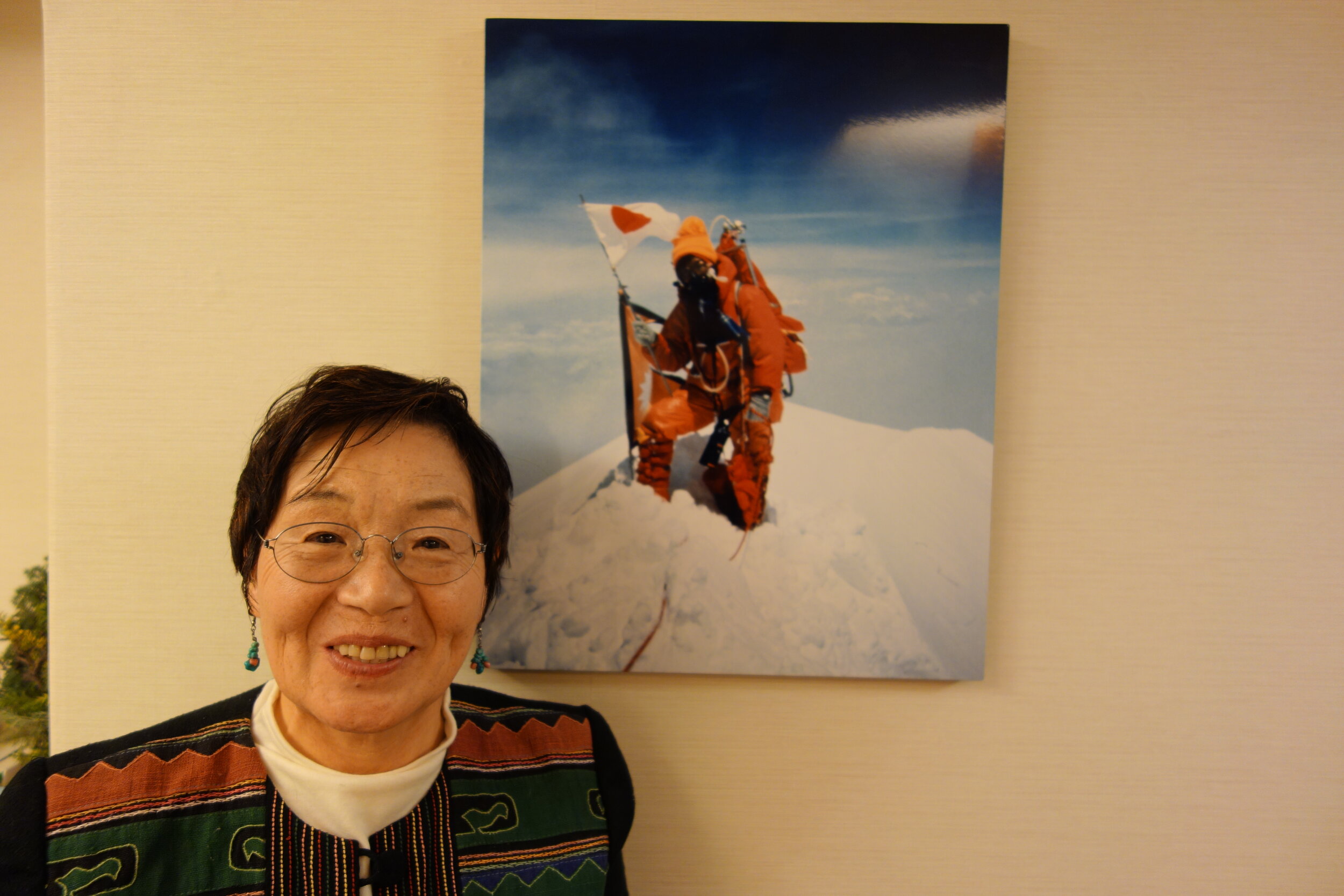Junko Tabei Interview (English transcript)
/I feel that I haven’t experiences many peculiar or strange things in high mountains. One thing would be dreams. Dreams of people who have long ago died - my father, mother, older sister. Whenever I go to the Himalayas I almost always dream of them. I wonder why.
When I am in Japan they simply don’t appear in my dreams, but in the Himayalas, I often see people from the past, and it is rather frequent.
I don’t feel that I have any particularly strong sense of the supernatural but there have been several experiences which I can recount. When I first climbed Tomur (Jengish Chokusu), a massif on the borders of China and Kyrgyzstan, I was swept away in a huge avalanche from over 6000m. I survived, and have survived three avalanches in my climbing. Three years after returning from this trip, I was approached by a climbing team from a university in Yokohama. A former colleague from an Everest expedition was married to one of the team, who were all women, and they wanted to go back to Tomur to be the first Japanese to summit. I warned them that this was a mountain full of dangers, and that they should try to find a different route to where we had been. But the team of three climbers went, and ended up being killed in an avalanche almost exactly in the same area where we had been swept away. One of the team members was married to my old friend, and had three children, and to this day I feel a sense of guilt about this.
Fifteen years after this, after the fall of the Berlin Wall, I returned to this mountain, but from the Kyrgyzstan side. It looked like a totally different mountain. It has a long four kilometer traverse at 7000m, something not seen in many other mountains. We climbed to the ridge and looked down to the Chinese side, where we had been swept away in the avalanche. I thought that the three from Yokohama had also died there. We dug a snow cave and spent the night there. The next morning, as we were about to set off for the summit, I suddenly could not move. I never get altitude sickness, but I felt totally immobile, my feet would not budge. I asked for oxygen and took some, and finally felt a little better. But as I began to move, I felt a very heavy weight on my shoulders. I had never felt this before, and thought that it was the spirits of the three woman climbers who had died there, and they wanted to climb with me to the summit. It was tough, but I carried on to the summit. I could not tell the others about this. On descent, I again gave a little prayer for the souls of the woman and after five minutes, the weight suddenly left me. It was as if I was breathing for three, but suddenly I could breath again and almost jumped down the mountain. I could not tell this story to anyone for many years. I prayed again back at base camp for them and returned to Japan. This was a first for me.
Photo: Roger McDonald, 2015.
There is one more story, which I could never tell people for many years. I was climbing in Tibet and sleeping in a tent at night. I heard the sounds of feet sliding on tatami, and a voice calling me, ‘Tabei san”. But I could not move, it was as if I was tied down. Time passed and later back at base camp, I heard that two of my friends had been unable to descend from near the summit of Everest. My experience had happened at the same time as this. It was very strange, and I could hear this clearly. My two friends died up there on Everest. Kato Yasuo and Kobayashi Tsujiaki. Kato was a veteran climber and if he had been successful, he would have summited Everest in all four seasons.
I have never suffered much from high altitude sickness, perhaps my body is like this. Mt Fuji was the highest mountain I had climbed, and my next was Annapurna in the Himayala! Many of my friends suffered terribly with altitude sickness, but I have never had this. I could go up to 7000m without much effect, only a feeling of slight light-headedness. I could always eat well and have no headaches. Maybe I am built very sturdily. I only usually take oxygen from above 7500m, in order to sleep well. Without oxygen, there is another kind of cold that is beyond description, it makes you funny it is so cold.
I get over these extreme intense moments just by will power. I am always thinking of safely getting down the mountain, step by step.
Returning safely, alive is what keeps me going.
My extreme limits are something which I can sense, and I desperately try to hold on to reason, by telling myself that I can do it, I can go a little further. Somehow some power or energy emerges, and I never give up or sense futility. I have never given up a climb on my own, but only if the situation around me is so unforgiving that we are in danger, like in Tomur where there were avalanches even at night. The most important this is to return alive with the same numbers of people as started.
Climbing is a group, team endeavour, but at the same time something very lonely, we are roped together, but also very alone. But I also think about the safety of my partners above me or below me. This is something different to climbing solo, like Messner I think.
I have also felt differences between all woman climbing expeditions and mixed expeditions. I find that men have more pride, and want to always go up first and faster, even one step faster. I never feel a sense of racing, but often because I usually go quite fast, I pass many men and they look at me in a funny way! Men have a high sense of pride!
After I climbed Everest, the media all asked me how it was as a woman. Even Reinhold Messner interviewed me in Kathmandu, as he was climbing Lhotse. He asked me very directly if I climbed as a woman or a human being. I was quite surprised that he asked me this, as I always climb as a human being.
The passage of time and duration in the mountains is also something very interesting. The watch is really a life saver for me, it is a living organism, always moving. In the most extreme situations, standing all night on a tiny ledge, I look at my watch and it tells me that time is moving forward and soon the dawn light will emerge. I was always looking at my watch, time seems to move so slowly sometimes. But time also sometimes feels very fast - like when you are near the summit, and think that it is quite far, but suddenly you are there.
I am always overawed by the greatness of nature, mountains and landscapes. Everything moves according to the laws of nature, the sun come up and goes down. I feel very lucky that I have seen so much of nature. It is like a cosmic law I suppose. And we humans who observe this are so small, so insignificant. We cannot stop any of nature’s motions. We simply return to the earth eventually. Each moment is so important. We can never race ahead.
Society moves very fast, but the mountains teach us a different sense of time, about waiting or patience. Our time is very limited on this earth. I don’t feel that we leave behind money or things, but we each build our own history through experiences. So I want people to try doing the things which they really want to do, and make their own history as rich as possible. I have also had an illness recently, and this has left me with a deep impression of what it means to live, and to make each day precious in the most deepest way.
Interview held March 16 2015, Tokyo by Roger McDonald.


